I should mention that all opinions expressed here are mine and mine alone, and in no way reflect the positions of the United States Government or the Peace Corps.
A preface:
Always the question beckons, do I attempt to display, through the written word, my observations of the world? My life? To do so is to inevitably reduce, simplify, and risk mis-representing feeling, sounds, beauty, people— everything. In truth, it can not be done. I cringe at the task. the lived experience, of any kind is far too intricate and psychedelic to be rendered through these awkward lines and squiggles. Even pictures are mere ‘shadows on the wall of the cave’ when compared to life itself.
So what can I say? I will write. I will forsake brevity. I will attempt to convey detail, depth and meaning.
Anyway
What my life is like.
Until Dec 1st I live partially in Mbour, a city on the Atlantic 2 hours south of Dakar with a host family, and the rest of the time in Thies, 1.5 hours east of Dakar at the PC training center. My name is Omar Cissokho.
Life in Mbour is fun. It’s fairly dynamic. My host family lives about a 25 minute walk from the beach, and slightly closer to the centre ville. Mbour has some tourism, yet its beaches are free of unsightly high-rise hotels and gated villas. It is for the most part pretty casual. But every day I see more Toubabs (gringos) in the city. It is known for its fish market, one of the largest and most prosperous in Senegal. Trucks laden in fresh fish on ice depart for inland cities in quick succession to ensure that those Senegalese far from the sea can still enjoy Ceeb oo jeen, the national dish of Senegal, which translates from Wolof as rice and fish. (It is delicious, and generally has a smattering of vegetables, and a healthy dose of palm oil.)
Every day I wake up and after a breakfast that generally consists of part of a baguette and butter, along with a weak cup of nescafé I walk across the city, north and east, through streets inundated by sand, goats, children and trash to the garden where me and two other volunteers, John and Adam work. We are the Jaxanke group.
Jaxanke is a true minority language in Senegal. (see post 12 for how this language fits into the world) So there is are only 3 of us learning this language out of 64 volunteers in our ‘stage’. Each language group lives in host families in the same area, although most are closer than us (it is hard to find Jaxanké families in this part of Senegal), and each group has a garden plot that the work on durint PST (pre service training).
Our garden is in a school. This presents some significant challenges. (In addition to the fact that the soil is actually sand, and the sand is 25% trash.) Footprints in our beds our commonplace. There does not seem to be any way to keep the kids out of the garden.
It has been a difficult process, especially since we frequently go back to Thies for a week or so at a time. The groundskeeper at the school is also not quite attuned to permaculture. He ostensibly mistook our compost pile for a trash pile, and dumped a large amount of garbage onto it, knocking it over in the process.
But before all this took place, we proudly marked out our first beds.
Here is John digging the first shovelful of dirt, and our preliminary vegetable beds, pre planting.
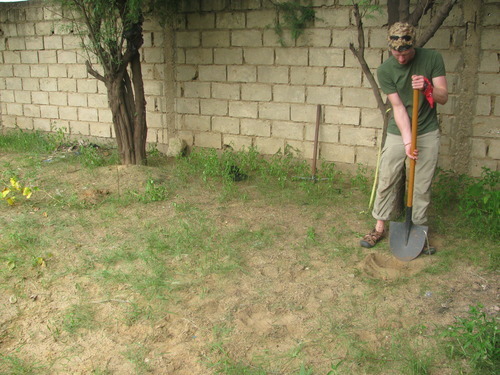
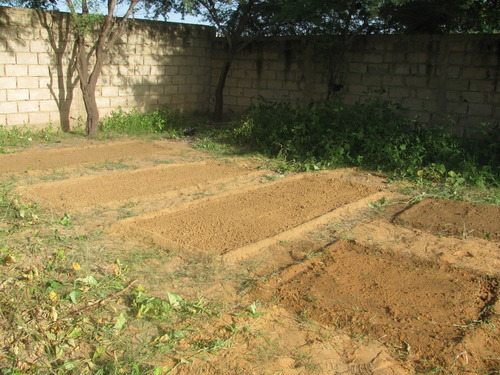
After watering the garden we walk over to our LCF’s (language and cultural facilitator) host family’s house. The walk is across a soccer field. Which is actually a large plain of sand. This ‘field’ bears a suspicious resemblance to a sweeping and unforgiving desert. Especially when it is hot. Despite this is it full of kids every afternoon playing soccer.
Our LCF’s name is Falaye Danfahka. Danfahka means buffalo killer in Jaxanké, and like many names in Senegal it is associated with a specific myth of familial genesis, as well as a class/ role in traditional society. Falaye is from Tambacounda, in the east of Senegal, along the Malian border. It is probably the hottest part of the country, and everybody points this out frequently. Falaye speaks the following languages, that I know of: Wolof, French, English, Jaxanké, Bambara, Mandinké, Fula Kounda, Pula Futa, He has taught 4 of them in with the Peace Corps. It is very impressive. He is an excellent teacher, and his knowledge of each of these languages is extensive both theoretically and practically. What’s more impressive is that in university he studied natural sciences, and is still considering medical school at some point, although he has confessed that linguistics is probably more interesting to him. And he is only 26. This is Falaye in action on one of our first days of class.
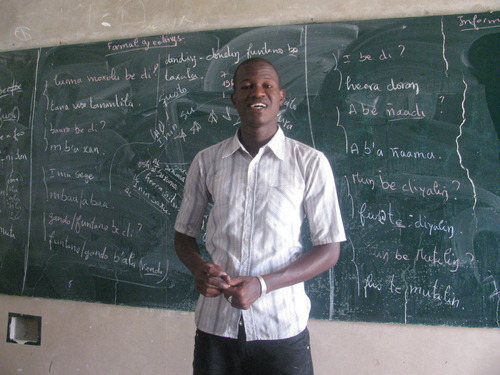
Mun be diyaliŋ?
When class is over, around noon 12:30 or so, we chat a little, and then I begin the trek back across town to my host family’s place for lunch. My location near the beach/centre ville is mostly advantageous, but it is far from class/work, perhaps 25 minutes each way.
Along the way I see lots of goats, ladies roasting and selling peanuts, men fixing cars, children calling me Toubab, asking for money, playing soccer, telling me to take their picture.
By the time I get back to the house it is generally around 1 o’clock, but I’ve still got a while to wait for lunch. It comes late here. This is the hungriest part of my day. Sometimes I help in the kitchen. I have a lot to learn from my host family’s cooks.
In this picture are my host sister in law, Adema (on the left), and host nieces Odie (Front right) and Fatumata (back right)
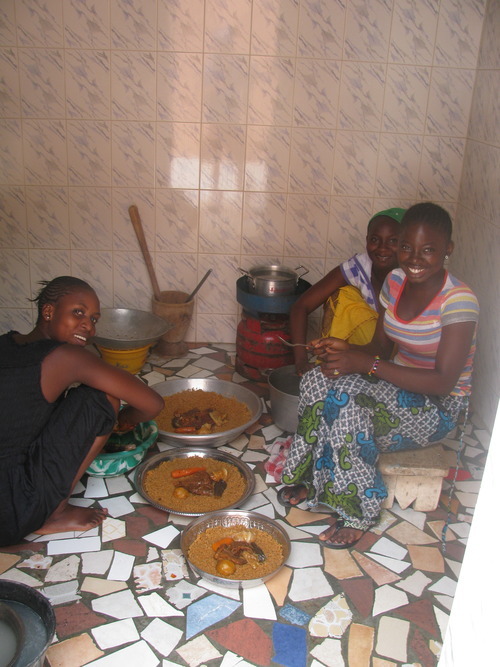
Until a week or two ago, there were about 10 more people living in this house; the kids, in-laws, nieces, grandkids and friends of my host parents, including all of the ladies pictured above. So every time they cooked they prepared not 1 but 3 delicious plates of food for the family.
I generally eat with my host parents, Limona (but she generally goes by her last name, Camera) and Mamadou, pictured here immidiately pre-lunch.
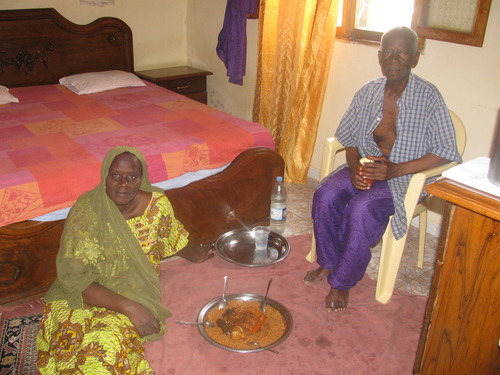
I can not say enough about the food at my PST host family’s house. For one thing I have to appreciate all the work that goes into it. The average Senegalese kitchen lacks many of the time saving devices we take for granted in the US.. The act of preparing a meal is thus much more labor intensive here, and yet no corners are cut, the fish is always cooked perfectly, and the rice golden and delectable, having been simmered in delicious meat, vegetable and spice broth. I could complain about how much of the food is actually just rice and corn, and how comparatively little protein there is in this diet—and I might later on— but I am feeling strong and healthy after a more than a month on this diet so I hold my peace for now.
After lunch I sometimes take a siesta, or read for a little while, or chat with my family, but more often than not I will wander down to my neighbors’ house to relax with friends.
It is pretty easy to make friends around here, especially as a non-tourist toubab. La pays de Terranga (country of hospitality, as Senegal is affectionately known) lives up to its name. I am invited by perfect strangers to drink tea on a daily basis, and invited in for dinner almost as often.
Such kindness was extended to me by some neighbors sitting in front of their house on my 2nd day in the city. I accepted, and had a seat amongst the small crowd of men women and children who sat under trees, on chairs and mats passing the hours in upbeat conversation. I quickly found myself having a really interesting conversation with the guy who invited me to talk, a fellow named Assane. Rapidly I realized that I had made a friend, perhaps a good friend. Assane, or Las as he is known, comes, as does most of his family, from the lower Casamance; Zigunchor.[1] He is also Soso, which is a Mandé ethnicity/language, and thus speaks a language closely related to Jaxanké, which I can practice with him. He is also a University student in French lit in Dakar.
The house here in Mbour where he lives is home to something like 120 people. Assane refers to them as the ‘grand famille,’ and it is clear that it is not clear exactly how everyone fits in. But everyone hangs out together, chats, argues and jokes in Mandinka (mostly) and eats together, drinks tea for hours and hours every day together. Assane and I have spend many an afternoon making/drinking tea, and chatting about everything from the idea of (under)development, the mandé language family, to the challenges of cultural adaptation. Here, we make tea, under the trees in front of his house.
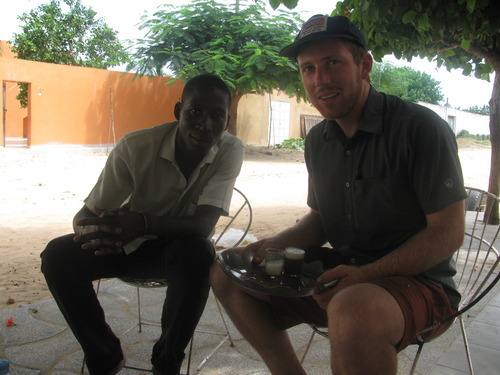
Las is back in Zig for the time being, helping his family harvest rice, peanuts, corn, sorguhm, and soon, fruit. I miss the companionship. As nice as people are here, it is something of a rarity to meet an educated individual, which whome you can discuss topics that breach banality. He was also a formidable scrabble foe. [read: 400 points last game]
After tea I often head back up to the garden to get some work done. My walk there is long, but generally pleasant. I try to take a different route every day, but I still pass by the same people all the time, and thus have lots of people to say hi to along the way. Almost all of these people invite me to dinner, for tea, etc. Life is tough. Actually though sometimes its a hassle, people interpret it as rude if you do not sit and hang with them every time you pass by. This is an issue if you have any kind of schedule, no matter how relaxed, and mine is quite relaxed.
At night I turn inward, read, write, think about my day.
That covers most of the basic facets of daily life here in Mbour. I saw the president, Mackey Sall drive by yesterday. He was down in a neighboring town called Saly checking out the tourism industry.
[1] This is the southwestern most part of the country, and is probably endowed with the greatest agriculture richess of any region. Much of France’s non- temperate produce comes from here. It is supposed to be beautiful, and is home to a Club Med. But Zigunchor is probably best known for its long-simmering separatist movement violence of extremely low intensity. Many of the people of Zigunchor seem to identify more with the culture and people of Guinea-Bisseau than that of Senegal. This part of Senegal was heavily influenced by the Portuguese and many people speak a Portuguese creole, as they do south of the border. There are also more non-Muslim ethnic groups in this part of Senegal, some of whom have a long history of militant resistance to conversion. They also see themselves as providing food for the whole country, and not enjoying a fair share of the booty. Many of these may be valid points. At this point however, the violence is almost non-existant, and yet the PC still prohibits travel to this region. (My hunch is that this is because we would not want to return.)
A preface:
Always the question beckons, do I attempt to display, through the written word, my observations of the world? My life? To do so is to inevitably reduce, simplify, and risk mis-representing feeling, sounds, beauty, people— everything. In truth, it can not be done. I cringe at the task. the lived experience, of any kind is far too intricate and psychedelic to be rendered through these awkward lines and squiggles. Even pictures are mere ‘shadows on the wall of the cave’ when compared to life itself.
So what can I say? I will write. I will forsake brevity. I will attempt to convey detail, depth and meaning.
Anyway
What my life is like.
Until Dec 1st I live partially in Mbour, a city on the Atlantic 2 hours south of Dakar with a host family, and the rest of the time in Thies, 1.5 hours east of Dakar at the PC training center. My name is Omar Cissokho.
Life in Mbour is fun. It’s fairly dynamic. My host family lives about a 25 minute walk from the beach, and slightly closer to the centre ville. Mbour has some tourism, yet its beaches are free of unsightly high-rise hotels and gated villas. It is for the most part pretty casual. But every day I see more Toubabs (gringos) in the city. It is known for its fish market, one of the largest and most prosperous in Senegal. Trucks laden in fresh fish on ice depart for inland cities in quick succession to ensure that those Senegalese far from the sea can still enjoy Ceeb oo jeen, the national dish of Senegal, which translates from Wolof as rice and fish. (It is delicious, and generally has a smattering of vegetables, and a healthy dose of palm oil.)
Every day I wake up and after a breakfast that generally consists of part of a baguette and butter, along with a weak cup of nescafé I walk across the city, north and east, through streets inundated by sand, goats, children and trash to the garden where me and two other volunteers, John and Adam work. We are the Jaxanke group.
Jaxanke is a true minority language in Senegal. (see post 12 for how this language fits into the world) So there is are only 3 of us learning this language out of 64 volunteers in our ‘stage’. Each language group lives in host families in the same area, although most are closer than us (it is hard to find Jaxanké families in this part of Senegal), and each group has a garden plot that the work on durint PST (pre service training).
Our garden is in a school. This presents some significant challenges. (In addition to the fact that the soil is actually sand, and the sand is 25% trash.) Footprints in our beds our commonplace. There does not seem to be any way to keep the kids out of the garden.
It has been a difficult process, especially since we frequently go back to Thies for a week or so at a time. The groundskeeper at the school is also not quite attuned to permaculture. He ostensibly mistook our compost pile for a trash pile, and dumped a large amount of garbage onto it, knocking it over in the process.
But before all this took place, we proudly marked out our first beds.
Here is John digging the first shovelful of dirt, and our preliminary vegetable beds, pre planting.


After watering the garden we walk over to our LCF’s (language and cultural facilitator) host family’s house. The walk is across a soccer field. Which is actually a large plain of sand. This ‘field’ bears a suspicious resemblance to a sweeping and unforgiving desert. Especially when it is hot. Despite this is it full of kids every afternoon playing soccer.
Our LCF’s name is Falaye Danfahka. Danfahka means buffalo killer in Jaxanké, and like many names in Senegal it is associated with a specific myth of familial genesis, as well as a class/ role in traditional society. Falaye is from Tambacounda, in the east of Senegal, along the Malian border. It is probably the hottest part of the country, and everybody points this out frequently. Falaye speaks the following languages, that I know of: Wolof, French, English, Jaxanké, Bambara, Mandinké, Fula Kounda, Pula Futa, He has taught 4 of them in with the Peace Corps. It is very impressive. He is an excellent teacher, and his knowledge of each of these languages is extensive both theoretically and practically. What’s more impressive is that in university he studied natural sciences, and is still considering medical school at some point, although he has confessed that linguistics is probably more interesting to him. And he is only 26. This is Falaye in action on one of our first days of class.

Mun be diyaliŋ?
When class is over, around noon 12:30 or so, we chat a little, and then I begin the trek back across town to my host family’s place for lunch. My location near the beach/centre ville is mostly advantageous, but it is far from class/work, perhaps 25 minutes each way.
Along the way I see lots of goats, ladies roasting and selling peanuts, men fixing cars, children calling me Toubab, asking for money, playing soccer, telling me to take their picture.
By the time I get back to the house it is generally around 1 o’clock, but I’ve still got a while to wait for lunch. It comes late here. This is the hungriest part of my day. Sometimes I help in the kitchen. I have a lot to learn from my host family’s cooks.
In this picture are my host sister in law, Adema (on the left), and host nieces Odie (Front right) and Fatumata (back right)

Until a week or two ago, there were about 10 more people living in this house; the kids, in-laws, nieces, grandkids and friends of my host parents, including all of the ladies pictured above. So every time they cooked they prepared not 1 but 3 delicious plates of food for the family.
I generally eat with my host parents, Limona (but she generally goes by her last name, Camera) and Mamadou, pictured here immidiately pre-lunch.

I can not say enough about the food at my PST host family’s house. For one thing I have to appreciate all the work that goes into it. The average Senegalese kitchen lacks many of the time saving devices we take for granted in the US.. The act of preparing a meal is thus much more labor intensive here, and yet no corners are cut, the fish is always cooked perfectly, and the rice golden and delectable, having been simmered in delicious meat, vegetable and spice broth. I could complain about how much of the food is actually just rice and corn, and how comparatively little protein there is in this diet—and I might later on— but I am feeling strong and healthy after a more than a month on this diet so I hold my peace for now.
After lunch I sometimes take a siesta, or read for a little while, or chat with my family, but more often than not I will wander down to my neighbors’ house to relax with friends.
It is pretty easy to make friends around here, especially as a non-tourist toubab. La pays de Terranga (country of hospitality, as Senegal is affectionately known) lives up to its name. I am invited by perfect strangers to drink tea on a daily basis, and invited in for dinner almost as often.
Such kindness was extended to me by some neighbors sitting in front of their house on my 2nd day in the city. I accepted, and had a seat amongst the small crowd of men women and children who sat under trees, on chairs and mats passing the hours in upbeat conversation. I quickly found myself having a really interesting conversation with the guy who invited me to talk, a fellow named Assane. Rapidly I realized that I had made a friend, perhaps a good friend. Assane, or Las as he is known, comes, as does most of his family, from the lower Casamance; Zigunchor.[1] He is also Soso, which is a Mandé ethnicity/language, and thus speaks a language closely related to Jaxanké, which I can practice with him. He is also a University student in French lit in Dakar.
The house here in Mbour where he lives is home to something like 120 people. Assane refers to them as the ‘grand famille,’ and it is clear that it is not clear exactly how everyone fits in. But everyone hangs out together, chats, argues and jokes in Mandinka (mostly) and eats together, drinks tea for hours and hours every day together. Assane and I have spend many an afternoon making/drinking tea, and chatting about everything from the idea of (under)development, the mandé language family, to the challenges of cultural adaptation. Here, we make tea, under the trees in front of his house.

Las is back in Zig for the time being, helping his family harvest rice, peanuts, corn, sorguhm, and soon, fruit. I miss the companionship. As nice as people are here, it is something of a rarity to meet an educated individual, which whome you can discuss topics that breach banality. He was also a formidable scrabble foe. [read: 400 points last game]
After tea I often head back up to the garden to get some work done. My walk there is long, but generally pleasant. I try to take a different route every day, but I still pass by the same people all the time, and thus have lots of people to say hi to along the way. Almost all of these people invite me to dinner, for tea, etc. Life is tough. Actually though sometimes its a hassle, people interpret it as rude if you do not sit and hang with them every time you pass by. This is an issue if you have any kind of schedule, no matter how relaxed, and mine is quite relaxed.
At night I turn inward, read, write, think about my day.
That covers most of the basic facets of daily life here in Mbour. I saw the president, Mackey Sall drive by yesterday. He was down in a neighboring town called Saly checking out the tourism industry.
[1] This is the southwestern most part of the country, and is probably endowed with the greatest agriculture richess of any region. Much of France’s non- temperate produce comes from here. It is supposed to be beautiful, and is home to a Club Med. But Zigunchor is probably best known for its long-simmering separatist movement violence of extremely low intensity. Many of the people of Zigunchor seem to identify more with the culture and people of Guinea-Bisseau than that of Senegal. This part of Senegal was heavily influenced by the Portuguese and many people speak a Portuguese creole, as they do south of the border. There are also more non-Muslim ethnic groups in this part of Senegal, some of whom have a long history of militant resistance to conversion. They also see themselves as providing food for the whole country, and not enjoying a fair share of the booty. Many of these may be valid points. At this point however, the violence is almost non-existant, and yet the PC still prohibits travel to this region. (My hunch is that this is because we would not want to return.)
No comments:
Post a Comment